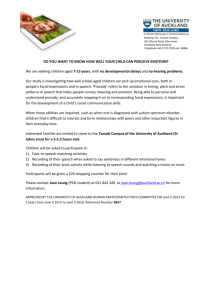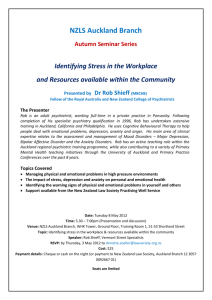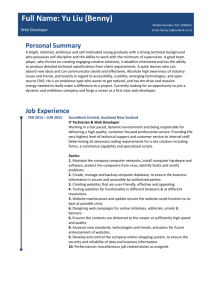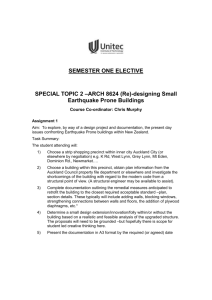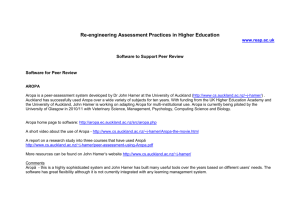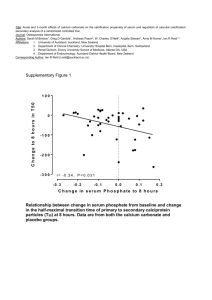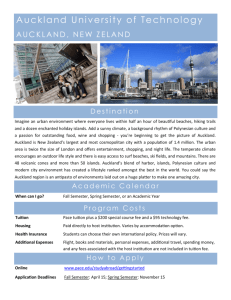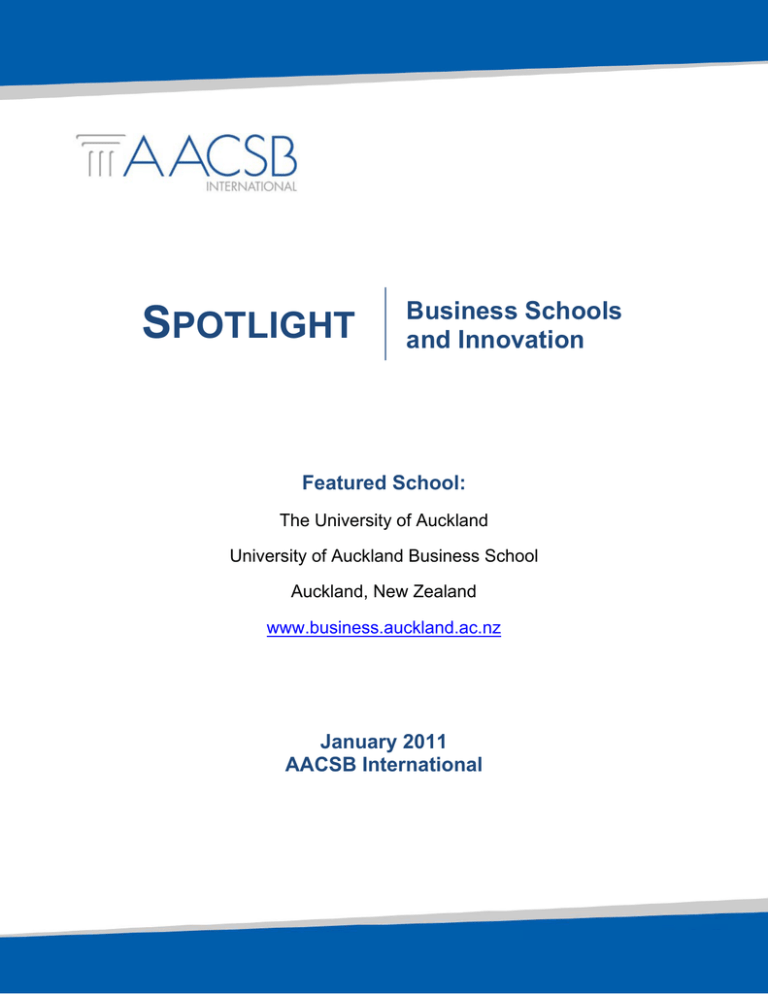
SPOTLIGHT
Business Schools
and Innovation
Featured School:
The University of Auckland
University of Auckland Business School
Auckland, New Zealand
www.business.auckland.ac.nz
January 2011
AACSB International
SPOTLIGHT | Business Schools & Innovation
University of Auckland | 2
The University of Auckland Business School
In 2001, the University of Auckland hosted a conference, in partnership with the New Zealand
government, to address concerns regarding the economic future of the small South Pacific nation in a
world where knowledge and innovation will be key factors for determining social and economic success.
The conference, “Catching the Knowledge Wave”, brought attention to the importance of developing a
“knowledge economy” in New Zealand in order to reverse disturbing trends in its economic health. Among
the outcomes of the conference was a philosophical shift for The University of Auckland Business School
(UABS), which has since then “embraced a larger purpose for itself in the 21st century – to help raise
New Zealand’s living standards and quality of life by enhancing economic growth and prosperity,” says its
dean, Professor Greg Whittred1.
The UABS subsequently sought out best practices in the development and promotion of a culture of
innovation and entrepreneurship, both within New Zealand and abroad. According to Dean Whittred, a
team from the school went to Stanford, the Massachusetts Institute of Technology (MIT) and the
University of California, San Diego in the United States, and Oxford University, University College
London, and the University of Cambridge in the UK, to observe what they were doing and what regional
supporting ecosystems were in place. Ideas were then identified that could be translated into workable
initiatives in the New Zealand context.
Since then, the UABS has undertaken and promoted a number of initiatives both within the University and
across the Auckland region that are designed to build a culture of innovation and entrepreneurial activity.
Some of these initiatives originated within the business school itself, while others were developed in
conjunction with other University faculties and with external organizations. One, Chiasma, had its
beginning in a student-led program. Although they were developed separately, as they grew in size the
UABS integrated these mutually-reinforcing initiatives into a very successful “entrepreneurial ecosystem2,”
with which to promote its role as a catalyst for the economic development of New Zealand.
The ICEHOUSE
Working alongside eight corporate partners3, the UABS set up the ICEHOUSE (International
Centre for Entrepreneurship) in 2001 as a business incubator and growth center for start-ups and
established companies. The ICEHOUSE is available both to University of Auckland students and external
entrepreneurs who wish to develop small or medium enterprises (SMEs). The mission of the ICEHOUSE
is to help develop 350 of the estimated 3,000 firms considered necessary to propel New Zealand back
into the top half of OECD countries by 2013. Since its founding, more than 100 start-ups and over 1,000
established SMEs have benefitted from the programs of the ICEHOUSE.
The ICEHOUSE offers two distinct pathways to meet the needs of its customers: ICE Accelerator and ICE
Bridge. Owners of start-ups with well-defined business ideas can benefit from the ICE Accelerator, whose
residents have access to market validation services, a menu of incubation programs that include varying
levels of involvement, and advice from members of New Zealand’s largest network of angel capital
investors, the ICE Angels4.
For established SMEs, ICE Bridge offers short workshops and executive programs designed to help
owner-managers find innovative ways to drive their businesses. Since 2008, programs customized for
particular firms have also been offered through ICE Bridge environment. The ICEHOUSE is also
partnering with UABS and Thunderbird School of Global Management in the United States to develop a
© AACSB International. All Rights Reserved.
SPOTLIGHT | Business Schools & Innovation
University of Auckland | 3
new initiative, the Global Mindset Leadership Program, which provides “an elite environment tailored for
managers wanting to expand their companies’ international operations5.”
Student-led Initiatives
SPARK is an entrepreneurial development program adapted for the New Zealand business context from
similar programs at MIT and the University of Cambridge. The SPARK concept was introduced by the
UABS to the university’s Postgraduate Students Association. The Association then established it as a
student-run initiative in partnership with the ICEHOUSE and the School, which has hosted and nurtured it
since its establishment in 2003. SPARK is supported by a network of over 150 business community
leaders who act as judges for the SPARK Challenge business planning competitions, mentors for the
applicant teams, and speakers for the non-credit Vision to Business (V2B) and Ideas to Business (I2B)
programs that SPARK runs in conjunction with the UABS to help educate students and staff about the
fundamentals of building a business and how to convert ideas into submissions for its business planning
competitions.
SPARK runs two annual Challenge competitions. The “Ideas Challenge” offers prizes of 1,000 New
Zealand dollars (NZD), for the top ten commercial and top ten social entrepreneurship ideas in 1,000
words. Dean Whittred says approximately 25% of all Spark’s 300-400 annual entries are social ventures.
Winners are encouraged to attend SPARK’s Ideas to Business (I2B) workshop, where they will receive
assistance in further developing their ideas for entry in the main business planning competition, the
“$100k Challenge.” This competition offers all finalists (approximately 10 teams) a mentoring and
development package valued at 5,000 NZD, and total prizes in excess of 50,000 NZD, with a first prize of
20,000 NZD in seed capital plus six months of incubation in the ICEHOUSE. The student-run SPARK
oversight team itself has found several dedicated sponsors for these prizes6.
Teams are open to all people, but at least one member must be a current student or staff member of the
university. According to Dean Whittred, approximately 25% of all teams involve postgraduate students,
and about 8% also involve faculty. The competition is run across all faculties, with about one-third of the
entries coming from the Business School. Indeed, Dean Whittred says teams are encouraged to draw
upon a variety of the other faculties at the university, and have in the past included applicants from areas
as diverse as medicine, science, engineering, and even music. SPARK even helps people looking to form
teams around given concepts on its Team Builder website7. Since its founding, SPARK participants (or
“Sparkies”) have been responsible for the creation of no fewer than 73 start-up ventures that between
them now have products selling into selling into 22 countries8.
Chiasma is a spin-off of the SPARK initiative, launched in September 2004 by three PhD students in the
University’s Faculty of Medical and Health Sciences9. It forms linkages within the biotech-related faculties
in the University of Auckland (Faculty of Medical and Health Sciences, School of Biological Sciences,
Bioengineering Institute and UABS) and builds networks with the wider New Zealand biotech sector. Like
SPARK, Chiasma is student-run, and offers its student members seminars and workshops along with a
prize for the best biotech entry in the SPARK Ideas competition and networking and internship
opportunities within New Zealand’s biotech industrial community.
Chiasma has been responsible for promoting an “attitudinal about-face” among biotech students across
the university, who had previously demonstrated very little interest in commercialism10. The new Master of
Bioscience Enterprise (MBioEnt) program11, jointly run by the UABS, the Law Faculty, and the School of
Biological Sciences, was designed with Chiasma members in mind. The MBioEnt program commenced in
© AACSB International. All Rights Reserved.
SPOTLIGHT | Business Schools & Innovation
University of Auckland | 4
2006, and develops "business-savvy" scientists with an entrepreneurial mindset and particular strengths
in the legal and commercial aspects of bioscience.
The Entrepreneurs’ Challenge
In 2009, expatriate New Zealander businessman Charles Bidwill made a foundational donation of 3
million NZD to the UABS to invest in a new initiative known as the Entrepreneurs’ Challenge (EC). This
annual competition is aimed at promoting for-profit SMEs that have been in operation for at least two
years and have at least 1 million NZD in annual revenue12. The EC helps these promising New Zealand
businesses that have reached a critical stage in their growth and development in moving to the next level.
The goal of the EC is to create a self-sustaining growth fund for established New Zealand SMEs.
Dean Whittred says the EC has received as many as 110 applicants each year. Winners are selected by
the EC’s Investment Committee, a select group of experienced members of the New Zealand business
and investment communities, of which he is a member. Each year, one million NZD in loans is distributed
among the winners, who each receive between 200,000 and 500,000 NZD for three years at better-thanmarket interest rates, to achieve their business growth plan. In addition, winners gain publicity,
recognition, and expert feedback from the members of the Investment Committee, as well as access to
the networks of the UABS and the ICEHOUSE (which is also one of the eight partner organizations of the
EC)13. According to Dean Whittred, six firms have been selected to receive EC loans to date.
Learning from the “Business Ecosystem”
Over the years, says Dean Whittred, the operation of the various initiatives that make up UABS’ business
ecosystem has grown increasingly smooth, but their evolution has largely taken place on the periphery of
the business school’s portfolio by way of co-curricular activities. The UABS has now begun what Dean
Whittred describes as “placing the last piece of the jigsaw puzzle,” to wit, transforming the successes of
the business ecosystem into meaningful and beneficial impacts on the UABS’ program curricula.
The UABS’ Department of Management and International Business recently proposed a major review of
the school’s program curricula in order to align its degree programs more fully with the experiential
learning opportunities offered by the business ecosystem initiatives. Plans for a new undergraduate major
(along with a Graduate Certificate and a Graduate Diploma) in Innovation and Enterprise, and a new
postgraduate program, which includes a one-year taught Masters in Commercialization, Innovation and
Research, are all in the works, according to Dean Whittred. Additionally, the school is looking at ways of
making other programs connected to the ecosystem more available to students across the university.
To bring further focus to these efforts, and to support research, curricula, resources and networks in
entrepreneurship, innovation, and business growth, the Centre for Entrepreneurial Learning (CfEL) was
established in 2008. The CfEL “has been charged with developing an entrepreneurial curriculum within
the Business School that is grounded in experiential learning” and capable of achieving two outcomes:
“reshaping the mindset of students within the School and developing ‘business savvy’ scientists,
engineers, technologists and creative professionals” from University of Auckland students of other
faculties14. Directed by Geoff Whitcher, Commercial Director of UABS, it is also intended to serve as the
hub of the continually-evolving business ecosystem at the Business School.
Dean Whittred says having an active champion like Whitcher, who can engage multiple stakeholders and
constituencies with aplomb, is vital to the success of the ecosystem concept. Additionally, he gives a
© AACSB International. All Rights Reserved.
SPOTLIGHT | Business Schools & Innovation
University of Auckland | 5
great deal of credit to the passion of the student body. The success of initiatives such as SPARK and
Chiasma are possible only because they are enthusiastically student-led and have self-reinforcing buy-in
from the student population.
For example, Dean Whittred says, the current generation of “Sparkies” will offer training and mentorship
to the next, and alumni of the initiative frequently step forward as judges for its challenges as well. Finally,
he says, the business ecosystem concept can only succeed through the continuing engagement of the
school with external stakeholders such as the government, and the business community.
Acknowledgements: AACSB International is grateful for the assistance of Greg Whittred, Dean of the
University of Auckland Business School.
© AACSB International. All Rights Reserved.
SPOTLIGHT | Business Schools & Innovation
University of Auckland | 6
End Notes
1
University of Auckland, Centre for Entrepreneurial Learning. (2010) “Transforming Knowledge Into Wealth.” University of Auckland Business School promotional material, provided by Dean Whittred on November 11, 2010. P. iv. 2
University of Auckland Business School. (2010) Business Ecosystem web page. Electronic document, http://www.business.auckland.ac.nz/Schoolhome/TheBusinessSchool/Businessecosystem/tabid/1485/Default.asp
x, accessed November 12, 2010. 3
The ICEHOUSE. (2010) Our Partners web page. Electronic document, http://www.theicehouse.co.nz/Internal/InternalPartners/tabid/63/Default.aspx, accessed November 15, 2010. 4
The ICEHOUSE. (2010) ICE Angels web page. Electronic document, http://www.theicehouse.co.nz/tabid/59/Default.aspx, accessed November 17, 2010. 5
University of Auckland, Centre for Entrepreneurial Learning. (2010) “Transforming Knowledge Into Wealth.” University of Auckland Business School promotional material, provided by Dean Whittred on November 11, 2010. P. 7. 6
Spark. (2010) Gold Partners web page. Electronic document, http://www.spark.auckland.ac.nz/index.php?option=com_content&view=article&id=35&Itemid=119, accessed November 22, 2010. 7
Spark. (2010) Spark Team Builder web page. Electronic document, http://www.spark.auckland.ac.nz/index.php?option=com_aclassf&Itemid=100010, accessed November 18, 2010. 8
University of Auckland, Centre for Entrepreneurial Learning. (2010) “Transforming Knowledge Into Wealth.” University of Auckland Business School promotional material, provided by Dean Whittred on November 11, 2010. P. 6. 9
Chiasma, the Link in Biotech Enterprise. (2010) About us: History web page. Electronic document, http://www.chiasma.auckland.ac.nz/index.php?option=com_content&view=article&id=2&Itemid=25, accessed November 19, 2010. 10
University of Auckland, Centre for Entrepreneurial Learning. (2010) “Transforming Knowledge Into Wealth.” University of Auckland Business School promotional material, provided by Dean Whittred on November 11, 2010. P. 7. 11
University of Auckland, Faculty of Science. (2010) Master of Bioscience Enterprise (MBioEnt) web page. Electronic document, http://www.science.auckland.ac.nz/uoa/mbioent, accessed November 19, 2010. 12
University of Auckland Business School Entrepreneur’s Challenge. (2010) Eligibility Requirements web page. Electronic document, http://www.entrepreneurschallenge.co.nz/how‐to‐apply/eligibility‐criteria, accessed November 22, 2010. 13
University of Auckland Business School Entrepreneur’s Challenge. (2010) Entrepreneurs’ Challenge Partners web page. Electronic document, http://www.entrepreneurschallenge.co.nz/our‐network/partners, accessed November 22, 2010. 14
University of Auckland, Centre for Entrepreneurial Learning. (2010) “Transforming Knowledge Into Wealth.” University of Auckland Business School promotional material, provided by Dean Whittred on November 11, 2010. P. 12. © AACSB International. All Rights Reserved.


